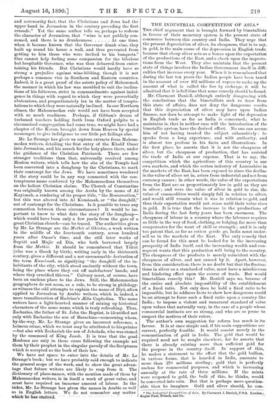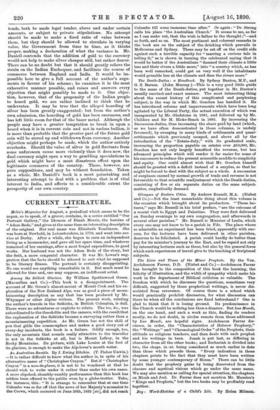THE INDUSTRIAL COMPETITION OF ASIA.*
THE chief argument that is brought forward by bimetallists in favour of their monetary system is the present state of commerce between this country and India. They urge that the present depreciation of silver, its cheapness, that is to say, in gold, is the main cause of the depression in English trade, because that cheap silver acts as a bonus upon the exportation of the productions of the East, and a check upon the importa- tions from the West. They also maintain that the present state of things involves the Indian Government itself in diffi- culties that increase every year. When it is remembered that during the last ten years the Indian people have been taxed in the amount of over 402 millions of rupees to make up the amount of what is called the loss by exchange, it will be admitted that it is full time that some remedy should be found.
Mr. Clermont Daniell, although entirely disagreeing with the conclusions that the bimetallists seek to draw from this state of affairs, does not deny the dangerous results that this depreciation of silver may have upon Indian finance, nor does he attempt to make light of the depression in English trade as far as India is concerned ; what he maintains is, that in neither case will the introduction of the bimetallic system have the desired effect. No one can accuse him of not having treated the subject exhaustively : he speaks from a long experience, and with authority, and is almost too profuse in his facts and illustrations. In the first place, he asserts that it is not the cheapness of silver, but the cheapness of production, that has assisted the trade of India at our expense. That is to say, the competition which the agriculture of this country in our own markets, and which the cotton industry of Lancashire in the markets of the East, has been exposed to since the decline in the value of silver set in, arises from industrial and not from currency causes ; in other words, the value of the exportations from the East are as proportionately low in gold as they are in silver ; and were the value of silver in gold to rise, the value of commodities would simply fall in relation to silver, and would still remain what it was in relation to gold, and thus their exportation would not cease until their value rises in gold. It is true that the increase in the productions of India during the last forty years has been enormous. The cheapness of labour in a country where the labourer requires so little in the way of food, clothing, or lodging, far more than compensates for the want of skill or strength ; and it is only too patent that, as far as cotton goods go, India must under- sell us in the markets of the East. The only remedy that can be found for this must be looked for in the increasing prosperity of India itself, and the increasing wealth and con- sequent wants that this production will bring to the country. The cheapness of the products is merely coincident with the cheapness of silver, and not caused by it. Apart, however, from this consideration, there is no doubt but that the fluctua- tions in silver as a standard of value, must have a mischievous and hindering effect upon the course of trade. But would bimetallism remedy this P Mr. Daniell says no, because of the entire and absolute impossibility of the establishment of a fixed ratio. Not only does he hold a fixed ratio to be impossible, but he adduces facts to show how dangerous would be an attempt to force such a fixed ratio upon a country like India; to impose a violent and unnatural standard of value upon values that naturally vary, in the case of a people whose commercial instincts are so strong, and who are so prone to suspect the motives of their rulers.
The author's own suggestion for reform has much in its favour. It is at once simple and, if his main suppositions are correct, perfectly feasible. It would consist merely in the remonetisation of gold in India. The gold that would be required need not be sought elsewhere, for he asserts that there is already existing more than sufficient gold for the purpose in the country itself. In support of this, he makes a statement to the effect that the gold bullion, in various forms, that is hoarded in India, amounts to more than 270 millions sterling ; gold that is perfectly useless for commercial purposes, and which is increasing annually at the rate of three millions. If the mints were reopened to gold, the bulk of this, he thinks, would be converted into coin. But that is perhaps more question- able than he imagines. Gold and silver should, he con-
• The Industrial Competition of Asia. By Clarmont J. Daniell, F.O.B. London; Began Paul, Tiench, and Co. tends, both be made legal tender, above and under certain amounts, or subject to private stipulations. No attempt should be made to make a fixed ratio of value between them, but they should be allowed to circulate in varying value, the Government from time to time, as it thinks proper, making a declaration of what the variance is. Mr. Daniell contends that the addition of gold to the currency would not help to make silver cheaper still, but rather dearer. There can be no doubt but that it should greatly relieve the strain on the Indian Exchequer, and facilitate the course of commerce between England and India. It would be im- possible here to give a full account of the author's argu- ments in favour of his scheme ; he examines it in the most exhaustive manner possible, and raises and answers every objection that might possibly be made to it. One objec- tion, however, that of the propensity of the Indian people to hoard gold, we are rather inclined to think that he underrates. It may be true that the alleged hoarding of silver has been greatly exaggerated; but from the author's own admission, the hoarding of gold has been enormous, and has left little room for that of the baser metal. Although the people may have a greater temptation to break in upon a hoard when it is in current coin and not in useless bullion, it is more than probable that the greater part of the future gold coin will be stored up and withdrawn from currency. Another objection might perhaps be made, which the author entirely overlooks. Should the value of silver in gold fluctuate from some unforeseen cause more violently than it does now, the dual currency might open a way to gambling speculations in gold which might have a most disastrous effect upon the legitimate commerce of the country. These, however, are pure suppositions, and may be without foundation. Taken as a whole, Mr. Daniell's book is a most painstaking and interesting attempt to deal with a problem that is of vital interest to India, and affects to a considerable extent the prosperity of our own country.



































 Previous page
Previous page